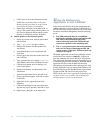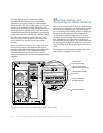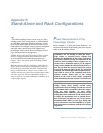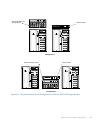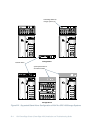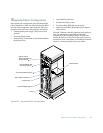
A-2 Dell PowerEdge Cluster (PowerEdge 4200) Installation and Troubleshooting Guide
You may choose to install a standard PowerEdge
Expandable RAID Controller as the second RAID
controller in your system instead of a cluster-enabled
RAID controller. This is the configuration you will use if
you plan to set up the internal hard-disk drives in the
cluster node in a RAID array. In this configuration, install
the standard RAID controller in PCI slot 6. Because this
standard RAID controller will handle the system partition
on the cluster node, do not disable this controller’s BIOS.
PCI slots 4 and 8 should be used for the cluster NIC
cards. Use PCI slot 8 for the public local area network
(LAN) and PCI slot 4 for the private node-to-node
network.
Figure A-1 shows the back view of a cluster node with
the two NICs installed in the recommended slot loca-
tions, the cluster-enabled PowerEdge Expandable RAID
Controller in PCI slot 7, and a standard PowerEdge
Expandable RAID Controller in PCI slot 6. Slot 5 is
where you would install a second cluster-enabled RAID
controller.
M
ounting, Cabling, and
Configuring the Cluster Hardware
When you have acquired all the necessary hardware and
software cluster components, you are then ready to install
and connect the components into a clustered system. If
you are installing the PowerEdge Cluster in a Dell Rack-
Mounted Solutions enclosure, refer to Appendix B,
“Stand-Alone and Rack Configurations,” for proper
placement of the PowerEdge Cluster components in the
rack. Instructions are also provided for installing the
3Com network switch in the rack. For further instructions
for mounting Dell equipment in a Dell rack, refer to the
Dell PowerEdge Rack-Mountable Solutions Installation
Guide.
For instructions on cabling the components into a clus-
tered system, see Chapter 2 in this guide.
Figure A-1. Back View of a PowerEdge 4200 Cluster Node
LAN-connected NIC
node-to-node
interconnected NIC
standard RAID controller
(optional)
cluster-specific RAID
controller (required)
second cluster-specific
RAID controller (not shown)



